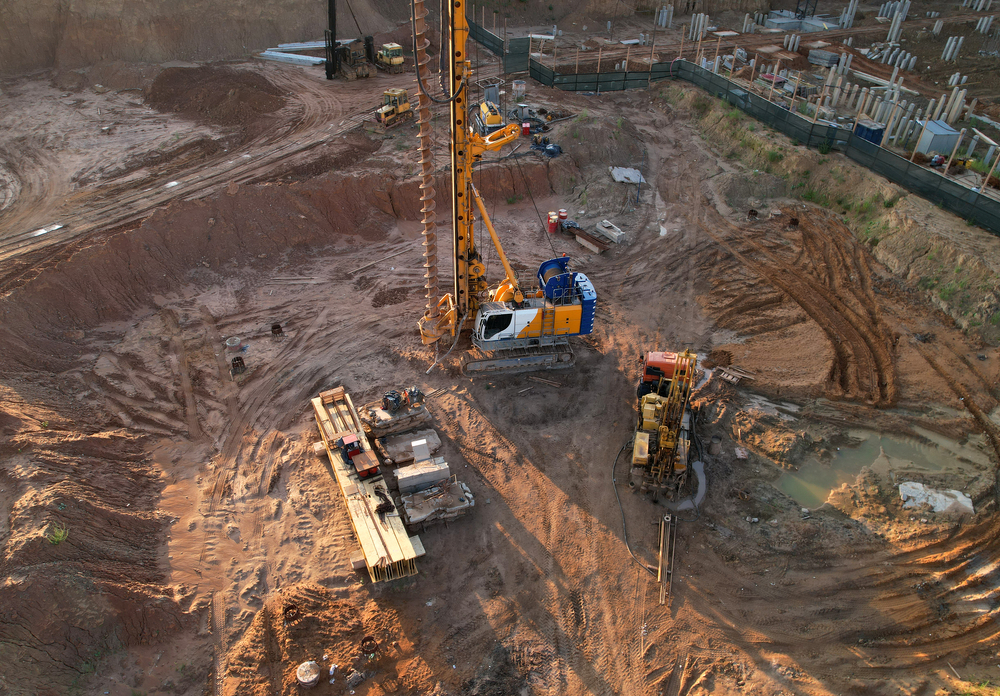The Main Principles Of Geotheta
Table of ContentsIndicators on Geotheta You Should KnowThe Greatest Guide To GeothetaSome Known Facts About Geotheta.How Geotheta can Save You Time, Stress, and Money.See This Report on Geotheta

They perform site examinations, accumulate samples, perform laboratory examinations, and examine information to review the suitability of the ground for building and construction projects - Engineer of Record. Based upon their findings, geotechnical engineers supply referrals for structure style, slope stability, retaining structures, and reduction of geotechnical threats. They work together with other professionals, such as architects, structural engineers, and building teams, to ensure that geotechnical factors to consider are integrated right into the total job layout and execution
By examining the behavior and homes of dirt and rock, they can recognize potential geotechnical threats such as landslides, soil settlement, or incline instability. Their know-how helps avoid failings or accidents that can threaten lives and residential or commercial property. Right here are some detailed duties and duties of a geotechnical engineer: Website Examination: Geotechnical designers conduct website examinations to gather information on subsurface conditions.
They analyze the data to recognize the homes and actions of the soil and rock, including their strength, permeability, compaction characteristics, and groundwater problems. Geotechnical Evaluation and Style: Geotechnical engineers examine the information gathered throughout website investigations to examine the stability and suitability of the website for building and construction projects. They carry out geotechnical computations and modeling to evaluate aspects such as bearing capacity, negotiation, incline security, lateral planet stress, and groundwater circulation.
Geotheta - An Overview
Foundation Layout: Geotechnical engineers play a critical function in designing foundations that can securely support the desired framework. They analyze the soil conditions and lots demands to figure out the proper foundation type, such as superficial structures (e.g., footings), deep structures (e.g (https://www.openlearning.com/u/ianhammond-shld0k/)., heaps), or specialized methods like soil renovation. They take into consideration aspects such as settlement restrictions, birthing ability, and soil-structure interaction to create optimum foundation designs
They review building and construction plans, display website tasks, and carry out field assessments to confirm that the design recommendations are adhered to. If unexpected geotechnical issues arise, they analyze the situation and supply recommendations for remediation or modifications to the style. Threat Assessment and Reduction: Geotechnical designers examine geotechnical dangers and risks connected with the project site, such as landslides, liquefaction, or soil erosion.

Collaboration and Communication: Geotechnical designers work closely with other specialists included in a job, such as engineers, architectural designers, and building and construction teams. Efficient communication and partnership are necessary to incorporate geotechnical considerations right into the general job design and building procedure. Geotechnical designers offer technical expertise, response questions, and make sure that geotechnical needs are satisfied.
The smart Trick of Geotheta That Nobody is Discussing
Below are some kinds of geotechnical designers: Structure Engineer: Structure engineers specialize in creating and assessing foundations for frameworks. They analyze the dirt conditions, lots requirements, and website features to determine the most ideal structure kind and design, such as superficial structures, deep foundations, or specialized methods like heap structures.
They review the aspects influencing slope stability, such as soil residential or commercial properties, groundwater problems, and slope geometry, and establish strategies to avoid slope failings and mitigate dangers. Earthquake Engineer: Quake engineers specialize in analyzing and designing frameworks to endure seismic pressures. They analyze the seismic hazard of a site, examine soil liquefaction possibility, and establish seismic layout standards to make sure the safety and durability of frameworks during earthquakes.
They execute field screening, accumulate samples, and assess the accumulated data to define the soil residential properties, geologic developments, and groundwater conditions at a site. Geotechnical Instrumentation Engineer: Geotechnical instrumentation designers focus on tracking and determining the actions of dirt, rock, and frameworks. They mount and maintain instrumentation systems that keep track of factors such as soil negotiation, groundwater degrees, slope motions, and architectural displacements to analyze efficiency and offer early cautions of prospective problems.
Geotheta for Dummies
They conduct tests such as triaxial examinations, debt consolidation examinations, direct my link shear examinations, and permeability examinations to collect information for geotechnical evaluation and style. Geosynthetics Engineer: Geosynthetics engineers concentrate on the design and application of geosynthetic materials, such as geotextiles, geogrids, and geomembranes. They utilize these materials to improve dirt security, reinforce slopes, provide drainage options, and control disintegration.
They tend to be investigatory individuals, which suggests they're intellectual, reflective, and inquisitive. They wonder, methodical, rational, logical, and rational. Several of them are also social, suggesting they're kind, generous, participating, patient, caring, helpful, empathetic, tactful, and friendly. Does this audio like you? Take our totally free profession test to figure out if geotechnical designer is just one of your top job matches.
In the office setting, geotechnical designers use specialized software devices to carry out estimations, create layouts, and evaluate data. They prepare records, review project specs, interact with clients and group participants, and coordinate project tasks. The workplace setting gives a helpful atmosphere for research, evaluation, and partnership with other specialists included in the project.
3 Easy Facts About Geotheta Explained
They regularly check out job websites to perform site examinations, assess geotechnical problems, and gather information for evaluation. These gos to include taking a trip to various areas, in some cases in remote or tough terrains. Geotechnical designers may carry out dirt sampling, conduct examinations, and screen construction tasks to make sure that the geotechnical facets of the project are being implemented properly.
Geotechnical designers also operate in specialized geotechnical laboratories. In these centers, they carry out experiments, carry out examinations on dirt and rock samples, and examine the design residential properties of the materials. Geotechnical laboratory designers function thoroughly in these settings, dealing with screening devices, running instruments, and taping data. They work together with various other research laboratory team to make sure accurate and trusted testing results.